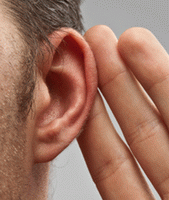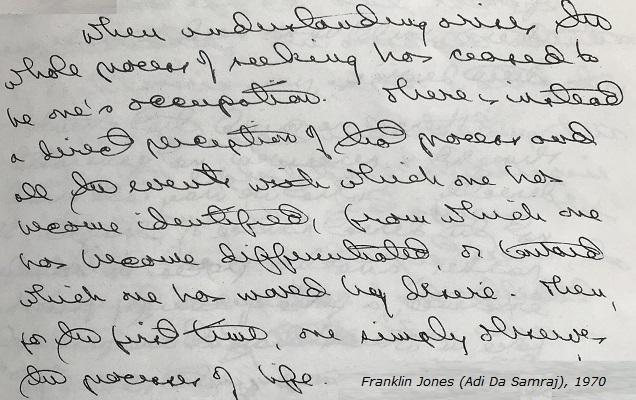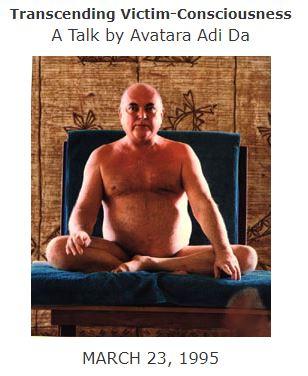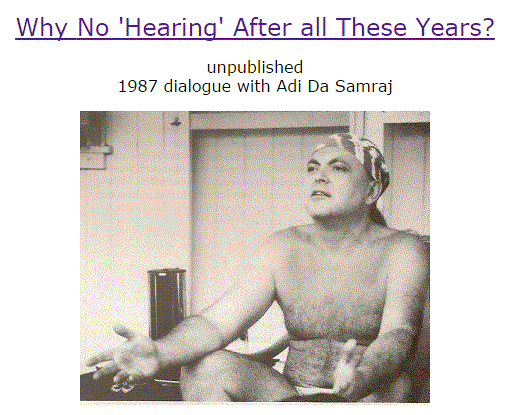“Hearing”

Square One in the Spiritual Understanding of Adi Da Samraj
“The entire process of the Way of the Heart is a progressive development of the process of hearing.”
Adi Da Samraj
The Capability of True Hearing
*** ‘If you are truly Spiritually Awakened, then you inherently transcend the apparently separate self and the apparently objective world—in every moment. Even if the machine of the body-mind is active in one or another manner—as it inevitably is, because it is born in the frame of space and time—no action need bind you in any manner whatsoever, if you will rightly understand the nature of the body-mind and the world, and if you will practice life on the basis of that right understanding.” The Dogmas of Social Morality Versus the Esoteric Spiritual Teaching That Is At the Origin of Traditional Religions
“Once insight awakens relative to the conventional psycho-physical self-reference and it is Realized to be itself only a condition (contraction) of the native Being-Energy wherein all conceptions, presumptions, perceptions, and sensations arise – then “ego” and “matter” become transparent in the Unconditional Being-Energy that is always already the Condition of “I” and all the “forms” that arise as experience.
This Realization is the first, primary, or foundation Moment (or level) of Enlightenment.” Two Moments of Enlightenment
“Considering” the “Perfect Practice” from time to time is good, as we’ve discussed. But you must concentrate in this hearing matter, listening to My Word about this hearing matter, until you find yourself located in the place of the self-contraction and have the capability to feel beyond it. That’s the zone of your seriousness because its the capability fundamental to this whole matter of becoming disentangled. Paradox of Entanglement
“The first great crisis of life occurs in all of us. But most of us simply go on from there to seek Happiness, or even to despair of It. The second great crisis of life occurs only in the case of those who can seriously accept and understand the Lesson of the first great crisis of life. Therefore, I Argue that Lesson, so that you may become serious, understand your un-Happiness, and begin the Way of Happiness Itself. The second great crisis of life is this process of serious understanding of un-Happiness and conversion to the Way of Happiness (rather than the futile search for Happiness). Such understanding is what I call “hearing” and such conversion is what I call “seeing.” It is only when such hearing and seeing prevail that the practice of the Way can begin.” Adi Da Samraj
According to Adidam, hearing is:
‘Hearing’ is a technical term used by Avatar Adi Da to indicate most fundamental understanding of the act of egoity (or self-contraction). Hearing Avatar Adi Da is the unique capability to directly transcend the self-contraction, such that, simultaneous with that transcending, there is the intuitive awakening to Avatar Adi Da’s Self-Revelation As the Divine Person and Self-Condition. The capability of true hearing can only be Granted by Avatar Adi Da’s Divine Grace, to His fully practicing devotee who has effectively completed the process of listening. Only on the basis of such hearing can Spiritually Awakened practice of the Way of Adidam truly (or with full responsibility) begin.
So understanding of self is a matter of observing the “self” in feeling (not merely intellectually) to the degree that the primal act, the self-contraction, is discovered as one’s activity. That discovery, which Avatar Adi Da Samraj calls hearing, then becomes one’s capability from that point on. In any moment, one can directly locate this activity and feel beyond it, transcending the sense of being a separate self.
Penetrating to the core of the ego and discovering the sensation that is the self-contraction (the sense of being a separate self) is the same as discovering that the self-contraction is one’s own activity. The moment of discovery is the moment of freedom, because the instant one discovers that the self-contraction is one’s own activity, one can (and will spontaneously) stop doing it. But how do I discover that the sense of separation is my own activity? I have to consciously be the one doing that activity. It can’t be something I am “looking at” from the outside.

Early description of ‘hearing’ – From the writings of Franklin Jones (Adi Da Samraj), 1970
Hearing is:
Utterly transforming, liberating.
Profoundly clarifying, and it is coincident with self-transcendence.
It is summary.
It is when the Way can begin.
ADI DA SAMRAJ: For the hearer, there’s simply the core of practice that deals directly with egoity. Everything follows from that. Until you’ve heard Me, you’re not dealing with egoity directly. You’re dealing with all the peripheral stuff. And that’s not it. That’s not Yoga.
To do the true Yoga of this Way, you have to be dealing with the core of it. It requires true hearing, true seeing, fundamental self-understanding, a profound central disposition. To just deal piecemeal with this, that, and the other thing, still wears you out. You are refreshed only by the transcendence of egoity. And then all the periphery, all the associations, are addressed spontaneously by that disposition
True hearing can not be achieved and is truly unspeakable, but at at the same time profound and all an encompassing realization…it is only ‘known’ in it’s ‘effects’ which is the beginning of purification and rebalancing of the body and mind.
Beezone
The Principle of human adaptation (or readaptation) is not found in either the lower or high dimensions of the body-being. It is at the center, between the lower and upper divisions or coils, each represented by three centers. The center wherein the human being becomes Awakened to the Principle on which it always already depends is the heart. The heart is the key to human consciousness, human Awakening, and truly human adaptation. Therefore, the culture of human readaptation. Therefore, the culture of human readaptation depends, from the beginning, on the intuitive Awakening of the heart to its condition in Truth. That Awakening is Realized through true “hearing”.
Unpublished notes – Adi Da Samraj 1975.
“Hearing penetrates the tendency to absolutize subjectivity. We all tend to make absolute the subjective sense of “l,” the sense of being inside the body, the bird in the cage. Our subjectivity is what we communicate most, not the process of its dissolution. We all have the tendency to think that my moving, correcting, changing, focusing, or somehow manipulating the subjective “I,” the being will be free. Most of us, really, think that inwardness is the way out of suffering. So do our traditions. The traditions tell us that if we go inward far enough and long enough that something spiritual will happen, that we will be changed. It is true, the mind may become quiet and even be replaced with lights and colors and sounds. But whether such phenomena appear or not, in the course of your practice, they are not Truth, and identifying with or searching for such phenomena is not sacrificial or lawful and violates the primary condition of service.”
Adi Da Samraj
“You (refer) to the self-contraction as a something you would not avoid. You were referring to it in objective terms as a something rather than as your own action. you’re not speaking from being in the position of the self-contraction, but you’re referring to the self-contraction. You’re having some experience of it. But as if you are outside it somehow, somewhere, and don’t quite have the key, then, to get rid of it. So you examine each piece of your life, and you see how you do it there in some behavioral or other terms or what not, and you work on that some, discipline it and so forth, and that gets better. But there’s still this disturbance, this stress, this pursuit, and so on.
(IN HEARING) Your examination of all that becomes summary. You become established in the knowledge of the act in the place of the act itself, such that it is entirely, immediately, always available to your relinquishment of it, because you are it, you’re being it, you’re doing it as an action, you’re in that very place and you know all about it.”
Adi Da Samraj – The Brightening Heart Series – ‘Consent to Be That Which You Are‘.
“The Teaching of the Way of Divine Ignorance is not truly either exoteric or esoteric. Rather, the Way involves Transcendental Awakening, or radical intuition, from the beginning. That intuition, or the Realization of Divine Ignorance, is Awakened through “hearing” or truly understanding the argument of the Teaching of Truth, and “seeing” or truly surrendering into the Company or Presence of the Spiritual Master.
Once this hearing and seeing are true of the devotee, the Way begins. And the beginning of the Way involves the transcendence of self through application to exoteric disciplines of a religious, moral, and personal kind. But these very disciplines are engaged from the point of view of true understanding, or prior Awakening to the Disposition of Divine Ignorance and direct surrender into the Transcendental Current of Life.”
The Enlightenment of the Whole Body
Hearing Has Nothing to Do with the Mind
Watch an exchange between Adi Da and a devotee in 2004 on the matter of Hearing.
NOTE: Hearing (See Beezone Study on HEARING) has a yogic component to it.
Adi Da Samraj and Devotee – K. Edwards
November 21, 2004

Hearing is No Small Matter – Yajna Discourse 1995-1996

Hearing is Liberating
ADI DA SAMRAJ: (talking to his devotees)…..You….are talking about “Narcissus” and how, as “Narcissus”, or the ego, you’re helpless, bound by your tendencies, and so forth. Its true enough, but that’s not an expression of hearing.
My discovery of “Narcissus”, the nature of the ego, or the nature of bondage, was liberating. I didn’t simply notice something and then thereafter simply have some description of Myself that explained why I was so bound. The understanding, the realization was utterly transforming, liberating. It wasn’t, “Meaculpa, I’m the ego, I’m Narcissus, I am bound, I am all kinds of tendencies, I am boring, I’m limited and a seeker and I cant get out of it.”
The understanding of “Narcissus” is not a self-description. Its a liberating understanding. To come to this understanding doesn’t merely give you a means to describe yourself and your bondage. That understanding itself is profoundly clarifying, and its coincident with self-transcendence.
If someone has heard Me, they would speak in different terms than the two of you just did. You could perhaps say some other things, but the language that you have used in this conversation so far is not the language of hearing. Its something of the language of having observed yourself, experienced your life in bondage, and you are somewhat tired of that and see what a bind it is.
SACRED HISTORY
1994 Lord Adi Da Samraj Gathers with devotees and Speaks about “radical” devotion to Him and True Hearing of Him. His Divine Presence, Parama-Sapta-Na Adi Da, Says:
“The practice is not just a matter of trying to feel Me. It is a fierce effort of surrender to Me. You must exercise the surrender of the faculties of body, emotion, mind, and breath in order to go beyond yourself. It is not comfortable. You must steal these faculties from their common ‘objects’. When you try to do it, the limit is revealed. This becomes True Hearing of Me–the understanding of the single fact that is your ego-possession. Then there is the capability, in any circumstance, and in every stage of practice-demonstration from then on, to enter into devotional Communion with Me.” – Adi Da Samrajashram
DEVOTEE: My question, Beloved, was, it’s to do with the self-contraction. And last evening You took us through locating the core of the self-contraction, doing the practice of feeling to You, and, you know, also at the same time not trying to get away from or recoil from the self-contraction at its core.
AVATARA ADI DA: Mm. I feel a Commentary coming on. [laughter] Your way of stating that, you see, illustrates the difference between listening, or not yet hearing, and hearing. You were talking about it as if in effect you were relaxing the self-contraction, almost like its a knot in your solar plexus or something, in Communion with Me. that’s how you were using the exercise. And that’s how it would be done from the point of view of non-hearing.
The point of view of hearing is at the point of the self-contraction, the point of the act of self-contraction, and in Communion with Me passes beyond directly, is flowering truly, not efforting against the self-contraction as if its somewhere else or someone else or a mechanism apart from you, just a sensation you’re experiencing. It’s not merely a sensation you’re experiencing. It is an act you are performing. You are doing the self-contraction. It is not merely happening to you.
I’ve used the illustration since the earliest days of a man pinching himself-you all know that one, right? And he’s uncomfortable and so forth, and tries to shake it off-whatever he does-and then eventually discovers he’s been pinching himself all the while and he takes his hand away and all his problem disappears.
Well, I’ve used that little bit to try to describe to you what hearing is about. Its not a matter of your dealing with a something that’s objective to you in the context of your human existence. It’s not objective to you. It may seem to be so, in some sense, until you hear Me. And that’s the fundamental description of the difference between non-hearing and hearing. In the case of the non-hearer, you don’t yet, at the place itself, understand most fundamentally that your search, your dis-ease, your struggle, and so on, your pain of existence, is something that you are doing.
So that’s hearing. From that point, you can, in Communion with Me, pass directly from the self-contraction, the act itself. And you can do this, then, under all circumstances, in every context of experience, no matter how the stages evolve from then. The same hearing gesture is your capability and your responsibility, and immediately, or very quickly, prepares you to do the Yoga of seeing Me, such that the hearing process is taking place in the full dimension of Spiritual existence. Then the purification is more profound and final.
Consent to Be That Which You Are

Why No ‘Hearing’ After all these Years?
Hearing is the penetration of the first three stages of life
Adi Da described Hearing (editorial Crazy Wisdom, Vol 6., No. 4, 1987) as a profound Samadhi, whose significance is greater than any of the conditional samadhis that may be experienced in the course of human evolution. Hearing is the penetration of the first three stages of life by Radical Understanding.
It is the breakthrough into life of unqualified Consciousness. The conscious process Awakened in hearing continues as the same unqualified force of understanding that penetrates and transcends the fourth, fifth, and sixth stages of life, until that same Consciousness is fully Realized in the seventh stage of life.
DEVOTEE: Sri Gurudev, I am confused about the root of the self-contraction that You are pointing to.
SRI DA AVABHASA: The root is the self-contraction.
DEVOTEE: Are You talking about the fundamental root of the conditional self as it is located in the right side of the heart in the sixth stage of life or are You talking about the characteristic way that we dramatize the ego in the first three stages of life?
SRI DA AVABHASA: I am describing the self-contraction as it may appear in any context or stage of life. It is still the same contraction.
DEVOTEE: Is it the same for each person or is it unique for that particular individual?
SRI DA AVABHASA: The manifestation of the self-contraction and its results are unique to each individual, but the fundamental action is the same. The ego-“I” is the same gesture in all cases. The center associated with the heart on the right is just the ultimate domain of this activity, which is uncovered in the ultimate stages of the Way of the Heart. The act is the same. The act is there in any moment or stage of life. And you are the one responsible for it. It is you. It is your very conditional existence.
DEVOTEE: Beloved Lord, self-contraction, if I understand it correctly, is the activity that we are presently doing at all times. It is a constant activity until it is Most Perfectly transcended in the seventh stage of life. Am I correct in saying that the practice, at our level of practice, which is in the first three stages of life, is about . . .
SRI DA AVABHASA: And the beginnings of the fourth.
DEVOTEE: . . . is about everything we have accumulated as egos in these first three stages and the beginning of the fourth?
SRI DA AVABHASA: Those are the results.
DEVOTEE: Those are the results, yes. So this is the work that must be done. Transcending the self-contraction . . .
SRI DA AVABHASA: You understand and transcend the self-contraction by entering into a “consideration” of your sphere of experience. In your case, at the moment, that is experience in the context of the first three stages of life and the beginnings of the fourth. When you are examining yourself, observing yourself in the context of practice, this is the sphere of experience that you are observing. At your present level of practice, you are not inspecting the kinds of experiences that are associated with the further advancement of the fourth stage of life or the fifth or the sixth or the seventh stage of life. That is not your sphere of experience, although here and there there can be some unusual experience. Fundamentally, you are dealing with the beginnings of the fourth stage of life and all of the first three stages of life. That is the sphere of your observation. The contraction is the same, in any case. It is the same self-contraction that is present in the fifth stage of life, or the sixth. It is the same act.
The ego has no features other than that very act. It has an apparent personality, it has all of its experiences, it has all of its associations. All of this characterizes the stage of life of the individual or the complex of stages of life in that apparent individual. But the ego itself is the primary act at the root of all the stages of life, the self-contraction itself. It is not a person. It is an action that suggests a person, an independent or conditionally manifested person, as a result.
DEVOTEE: Our experience at each stage of life integrates with the self-contraction to confirm the sense of separative self. So as we grow, we have additional experiences that the ego accumulates . . .
SRI DA AVABHASA: You can be a bigger ego as you advance in the ordinary evolutionary course—bigger in the sense that there is an enlarged sphere of the experiencing of the self-contraction as a conditionally manifested being.
ADI DA SAMRAJ: I started Communicating this Wisdom-Teaching, rather bright-eyed, more than a decade ago already, and I am still Struggling with the same lack of response in people that I encountered when I began. Nobody is really interested. I have not really seen any response to my Work. I have seen the usual, gleeful, sittingaround-at-a-lecture attitude with which people respond to movies and TV. The Teaching Argument is just a commonplace. To enter into a higher frame of existence is just not very important to people. They really do not care to do it, particularly if it requires great effort, great energy, great attention, great intelligence, great will. Anything great to be Realized requires all of those things, but people are used to being sold everything, as if they can just have it at a cost they can comfortably afford.
“In the event of hearing the process goes on. You would not have it be prolonged as a process of being aware of the self-contraction. You enter into Samadhi more and more continuously.
Well, so in the seventh stage Disposition. It is not a lapse into conditions. It is a Demonstration of the Divine Recognition of conditions.”
Adi Da Samraj
“Hearing is an awakening that comes in the summary of self-observation, not in some moment of seeing some thing about yourself. When you’ve seen the totality of it and see what the totality is, what it is, not what one portion of it is, when you see that it is self-contraction, when it is thoroughly understood in all of its opposites as being just the self-contraction and that is your own action, something that you are adding to reality in every moment, then bondage to that script is released and you awaken to that in which all of this has been arising and which it is happening, that to which all that is being added. That is Hearing. Hearing is a summary observation not the witnessing of some action.”
Adi Da Samraj
“True hearing, summary and most fundamental self-understanding, involves the core. It involves being responsible for that key dramatization. But it is a matter of being most fundamentally responsible for the act that precedes even that key dramatization. Therefore, it is also a matter of being responsible for all the other kinds of dramatization that are general tendencies of yours. True hearing covers it all, because it deals with the root. Hearing is not just a matter of dealing with fear or any other particular emotion. It is not a matter of dealing with any particular dramatization merely, nor of addressing any particular sensation in the general complex of the body-mind. It is a matter of dealing with the primary action that is the ego, the self-contraction itself. The ego is an action. Therefore, it has a sensation associated with it. But it is a sensation made into egoity itself, and it is not merely at the periphery. The self-contraction is not merely the dramatization appearing at the moment. It is the core of that dramatization, and of every dramatization.”
Adi Da Samraj
“There are two forms of self-Enquiry being practiced in My Company. One is self-Enquiry based on real self-understanding and, especially, on true hearing. In that case, self-Enquiry is most fruitful, obviously, and it takes the form I have just described. The other form of self-Enquiry is that which may be used by any of My devotees, even from the beginning of practice in the Way of the Heart, with little or no self-understanding. In that case, you exercise self-Enquiry relative to all kinds of things. You just described an instance of how self-Enquiry is done in that case, in the sheer beginners sense, with little or no self-understanding. But, as you described, in the doing of it, you observed something a little deeper behind this vital enthusiasm, a sense of despair. So your practice of self-Enquiry had some usefulness in the sense that it enabled you to observe something more. Using self-Enquiry in this ordinary fashion may serve self-observation, but, in that case, it is not the exercise of self understanding itself. It is not true self-Enquiry.”
Adi Da Samraj
“The bodys search for pleasure and the minds idealization of conditional states—it is all the same activity. To understand that it is all this activity of the self-contraction is hearing. True hearing is when you know that all of it is your search, when you are no longer involved in the objects of that search but are dealing directly with the self-contraction itself. True hearing is not a metaphysical matter, or an idea merely. It is this summary comprehension. In that comprehension, you are addressing the one thing that is your own contraction. You are dealing with the self-contraction moment by moment, regardless of what arises—because whatever arises, you are still always only engaged in the same activity. Knowing this is true hearing. Exercising the capability to stand free of the self-contraction based on this knowing is the capability of true hearing. This is the necessary foundation for practice in the addvanced and the ultimate stages of life in the Way of the Heart. Without the capability of true hearing, you would enter into the advanced and the ultimate stages of life as an oblivious addict.”
Duty, Tolerance and Self-Transcendence
Right Practice Depends on Hearing
Adi Da Samraj, November 11, 1978
